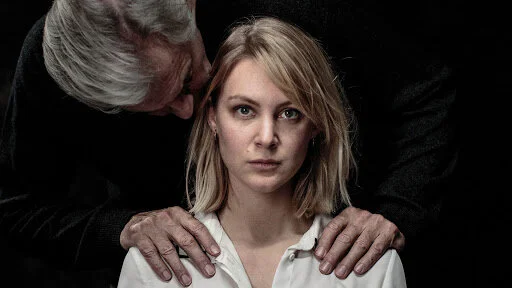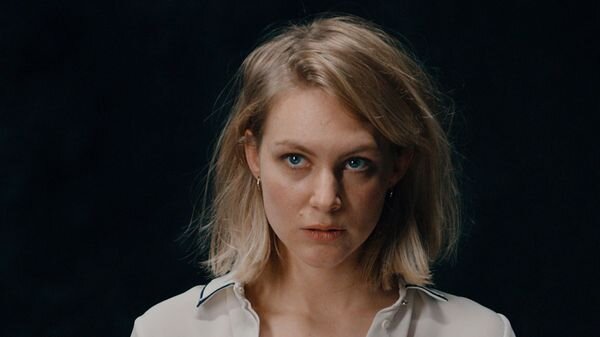[Film Review] Lili (2019)
After the exposure of film producer Harvey Weinstein in 2017, the ‘casting couch’ has gone from being a myth of Hollywood’s bygone era to a brutal reality that has underpinned decades of institutional abuse. Inspired by the #MeToo movement that unfolded in the wake of Weinstein's downfall, Yfke van Berckelaer’s short film Lili (2019) delivers a timely and powerful message about women’s inner strength in the face of real-life monsters, both inside and outside Hollywood.
Lili’s premise alone carries terrifying expectations that make it ideal for the horror genre: an audition room, a young actress and an older male casting director. Lili (Lisa Smit) reads for an anonymous director (Derek de Lint) who seems determined to push for her best performance. After several reads and some increasingly inappropriate requests, the audition grows to an agonising climax as the director makes his advances. But who is really in control, Lili or the director?
Filmed in a small space and a single take, Lili makes it impossible for us to look away. Its minimalistic setting succeeds in creating an atmosphere of no escape. From the isolated hotel of The Shining (1980) to Hunter’s toxic marriage in Swallow (2019), horror excels in dissecting what it feels like to be trapped and Lili is no exception. In the deathly silence of the audition room, anything could happen because the actress is cut off from the outside world. The one-shot technique makes us feel like we are witnessing the excruciating uneasiness of the audition in real time. It adds a sense of helplessness and escalating fear that is so authentic; that sense when things start to feel wrong and your gut is telling you to get out, yet you can’t.
In such a minimalistic film, the acting steals the show. Lisa Smit flexes every acting muscle possible in her role as the eager-to-please Lili. The detail of her performance is meticulous because we experience every emotion she is feeling through small gestures and facial expressions. When the casting director’s notes clearly take a sexual turn, the forced politeness of Lili’s smiles and nods speaks to the way that women are socially conditioned to keep the peace, laugh it off and avoid causing a scene, even when their safety is threatened. One detail that stood out was how Lili anticipates the director’s requests, hovering her fingers over her blouse in anticipation of having to undo a couple of buttons as though this has happened before. There is so much sadness in this one subtle gesture because it offers a glimpse into Lili’s world, where exploitation is normalised and the audition room is an unsafe space.
Although his role mainly takes place off camera, Derek de Lint’s presence is still imposing. He skilfully plays the fatherly manipulator, radiating paternal warmth to lure Lili into a false sense of security, even mentioning his own daughter. What’s really effective about de Lint’s character is that he’s not a creep from the get-go. He presents himself as a trusted mentor who you wouldn’t expect anything sinister from, encouraging Lili to relax into her role and push for her best performance. His path towards sexual assault is not violent but insidious and deeply manipulative, which feels more disturbing to watch and is perhaps a more realistic depiction of a couch casting scenario.
It’s hard to talk about this film without mentioning the ending. Just when you thought Lili was heading in one direction, it serves up a deliciously monstrous twist in its final moments. Although the film’s subject matter could certainly be described as horrific, its brutal and bloody finale is where the real horror element kicks in as Lili’s monstrous side is unleashed on the director in a violent act of self-defence. The ending is truly brilliant because you don’t see it coming, especially on a first watch. The attack happens off camera, which heightens the suspense. It also makes the monster reveal more impactful as we don’t know what’s happened until Lili appears back in shot with blood dripping from an enormous set of razor-sharp teeth. Lili’s hideous monster mouth is a stroke of genius, subverting the sexy female vampire or the blood-soaked blonde tropes that have been staples of horror cinema for generations. Her monstrosity doesn’t cater for the objectifying male gaze but for a female gaze that finds power and strength in horror.
The ending makes you appreciate Lili even more for its complexity because there are so many layers to its plot. Smit’s Gone Girl-esque performance takes on a whole new meaning when we realise that we have been lured in by Lili as much as the director has. Lili stays with you long after a first watch and it’s the kind of film that entices you to rewatch because there are so many intricate details to unravel. Something new jumps out at you each time and there is so much pleasure to be gained from uncovering these subtle clues along the way.







![[Film Review] V/H/S/85 (2023)](https://images.squarespace-cdn.com/content/v1/5fe76a518d20536a3fbd7246/1697455043249-K64FG0QFAFVOMFHFSECM/MV5BMDVkYmNlNDMtNGQwMS00OThjLTlhZjctZWQ5MzFkZWQxNjY3XkEyXkFqcGdeQXVyMTUzMTg2ODkz._V1_.jpg)
![[Film Review] Kill Your Lover (2023)](https://images.squarespace-cdn.com/content/v1/5fe76a518d20536a3fbd7246/1697465940337-T55VQJWAN4CHHJMXLK32/56_PAIGE_GILMOUR_DAKOTA_HALLWAY_CONFRONTATION.png)
![[Film Review] Shaky Shivers (2022)](https://images.squarespace-cdn.com/content/v1/5fe76a518d20536a3fbd7246/1696442594997-XMJSOKZ9G63TBO8QW47O/Screenshot+2023-10-04+at+18.59.33.png)
![[Film Review] Elevator Game (2023)](https://images.squarespace-cdn.com/content/v1/5fe76a518d20536a3fbd7246/1696440997551-MEV0YZSC7A7GW4UXM5FT/Screenshot+2023-10-04+at+18.31.42.png)
![[Film Review] A Wounded Fawn (2022)](https://images.squarespace-cdn.com/content/v1/5fe76a518d20536a3fbd7246/1695484054446-7R9YKPA0L5ZBHJH4M8BL/Screenshot+2023-09-23+at+16.42.24.png)
![[Film Review] Perpetrator (2023)](https://images.squarespace-cdn.com/content/v1/5fe76a518d20536a3fbd7246/1695483561785-VT1MZOMRR7Z1HJODF6H0/Screenshot+2023-09-23+at+16.32.55.png)
![[Film Review] Mercy Falls (2023)](https://images.squarespace-cdn.com/content/v1/5fe76a518d20536a3fbd7246/1695482997293-E97CW9IABZHT2CPWAJRP/Screenshot+2023-09-23+at+16.27.27.png)






















![[Editorial] 10 Films & Events to Catch at Soho Horror Film Fest 2023](https://images.squarespace-cdn.com/content/v1/5fe76a518d20536a3fbd7246/1700819417135-299R7L4P0B676AD3RO1X/Screenshot+2023-11-24+at+09.41.52.png)
![[Editorial] 9 Horror Nintendo Switch Games To Play](https://images.squarespace-cdn.com/content/v1/5fe76a518d20536a3fbd7246/1697214470057-3XZXX8N4LYIMDFWS6Z3P/Screenshot+2023-10-13+at+17.20.13.png)
![[Mother of Fears] Mothering in Silence in A Quiet Place (2018)](https://images.squarespace-cdn.com/content/v1/5fe76a518d20536a3fbd7246/1696445921315-HZJ2DZYQIH6VVWXBO2YL/Screenshot+2023-10-04+at+19.52.29.png)
![[Editorial] 5 Female Focused Horror Book Recommendations](https://images.squarespace-cdn.com/content/v1/5fe76a518d20536a3fbd7246/1696441981361-52EQCTJ7AT2QF1927GM7/919xtm6d3fL._AC_UF894%2C1000_QL80_.jpg)
![[Editorial] 9 Best Slashers Released Within 10 Years of Scream (1996)](https://images.squarespace-cdn.com/content/v1/5fe76a518d20536a3fbd7246/1695478839037-LOFHGVM3H6BMSZW7G83M/Screenshot+2023-09-23+at+15.15.11.png)
![[Mother of Fears] Mother Vs. Monster in Silent Hill (2006)](https://images.squarespace-cdn.com/content/v1/5fe76a518d20536a3fbd7246/1695485781119-H6GNP0G3J2TLPAOIABV7/Screenshot+2023-09-23+at+17.11.56.png)
![[Editorial] 9 Terrifying Cerebral Visions in Horror Movies](https://images.squarespace-cdn.com/content/v1/5fe76a518d20536a3fbd7246/1693509801235-X23OL50T1DVGECH0ZJK2/MV5BMjQ0MTg2MjQ4MV5BMl5BanBnXkFtZTgwMTU3NDgxMTI%40._V1_.jpg)
![[Mother of Fears] I Don’t Wanna Be Buried in a Pet Sematary (1989) and (2019)](https://images.squarespace-cdn.com/content/v1/5fe76a518d20536a3fbd7246/1691328766069-QFNAVJOMFZVZ5CLU1RWM/Screenshot+2023-08-06+at+14.23.13.png)

If you know me at all, you know that I love, as many people do, the work of Nic Cage. Live by the Cage, die by the Cage. So, when the opportunity to review this came up, I jumped at it.